- Home
- Paulo Coelho
Aleph Page 2
Aleph Read online
Page 2
I’M STANDING IN THE RAIN, SHIVERING, and my first thought is: “I’m going to catch the flu.” I console myself by thinking that every doctor I’ve ever met has assured me that flu is caused by a virus, not by drops of water.
I can’t stay in the here and now, my head is whirling: Where should I aim for? Where should I go? And what if I don’t recognize the people on my path? That must have happened before and is bound to happen again; if it hadn’t, my soul would be at peace.
After fifty-nine years of living with myself, I can predict at least some of my reactions. When I first met J., his words seemed to be filled with a light much brighter than he himself. I accepted everything without question; I walked fearlessly ahead and never once regretted it. But time passed, we got to know each other, and with familiarity came habit. He had never let me down in any way, but I couldn’t see him now with quite the same eyes. Even though, out of duty, I had to obey his words—which I would have done gladly in September of 1992, ten years after I met him—I no longer did so with the same conviction.
I am wrong. It was my choice to follow this magical Tradition, so why question it now. I’m free to abandon it whenever I wish, but something drives me on. He’s probably right, but I’ve got used to the life I lead and I don’t need any more challenges. I need peace.
I should be a happy man: I’m successful in my chosen, highly competitive profession; I’ve been married for twenty-seven years to the woman I love; I enjoy good health; I live surrounded by people I can trust; I’m always greeted with affection by my readers when I meet them in the street. There was a time when that was enough, but these last two years, nothing seems to satisfy me.
Is it just a passing anxiety? Won’t it be enough just to say the usual prayers, respect nature as if it were the voice of God, and contemplate the beauty around me? Why go forward if I’m convinced that I’ve reached my limit?
Why can’t I be like my friends?
The rain is falling ever harder, and all I can hear is the sound of the water. I’m drenched, but I can’t move. I don’t want to leave, because I don’t know where to go. J. is right. I’m lost. If I really had reached my limit, this feeling of guilt and frustration would have passed, but it’s still there. Fear and trembling. When a sense of dissatisfaction persists, that means it was placed there by God for one reason only: you need to change everything and move forward.
I’ve been through this before. Whenever I refused to follow my fate, something very hard to bear would happen in my life. And that is my great fear at the moment, that some tragedy will occur. Tragedy always brings about radical change in our lives, a change that is associated with the same principle: loss. When faced by any loss, there’s no point in trying to recover what has been; it’s best to take advantage of the large space that opens up before us and fill it with something new. In theory, every loss is for our own good; in practice, though, that is when we question the existence of God and ask ourselves: What did I do to deserve this?
Lord, preserve me from tragedy and I will follow Your desires.
The moment I think this, there is a great crack of thunder and the sky is lit up by a flash of lightning.
Again, fear and trembling. A sign. Here I am, trying to persuade myself that I always give the best of myself, and nature is telling me exactly the opposite: anyone truly committed to life never stops walking. Heaven and Earth are meeting in a storm that, when it’s over, will leave the air purer and the fields fertile, but before that happens, houses will be destroyed, centuries-old trees will topple, paradises will be flooded.
A yellow shape approaches.
I surrender myself to the rain. There’s more lightning, but my feeling of helplessness is being replaced by something positive, as if my soul were gradually being washed clean by the water of forgiveness.
Bless and you will be blessed.
The words emerge naturally from me—a wisdom I didn’t know I had, which I know does not belong to me but which appears sometimes and stops me from doubting everything I have learned over the years.
My great problem is this: despite such moments, I continue to doubt.
The yellow shape is there before me. It’s my wife, wearing one of the garish capes we use when we go walking in remote parts of the mountains. If we get lost, we’ll be easy to find.
“Have you forgotten that we’re going out to supper tonight?”
No, I haven’t forgotten. I abandon universal metaphysics, in which thunder claps are the voices of the gods, and return to the reality of a provincial town and a supper of good wine, roast lamb, and the cheerful conversation of friends, who will tell us about their recent adventures on their Harley-Davidson. I go back home to change my clothes and give my wife a brief summary of my conversation with J. that afternoon.
“Did he tell you where you should go?” she asks.
“He told me to make a commitment.”
“And is that so very hard? Stop being so difficult. You’re acting like an old man.”
HERVÉ AND VÉRONIQUE have invited two other guests, a middle-aged French couple. One of them is introduced as a “clairvoyant,” whom they met in Morocco.
The man seems neither pleasant nor unpleasant, merely absent. Then, in the middle of supper, as if he had entered a kind of trance, he says to Véronique: “Be careful when driving. You’re going to have an accident.”
I find this remark in the worst possible taste, because if Véronique takes it seriously, her fear will end up attracting negative energy, and then things really might turn out as predicted.
“How interesting,” I say, before anyone else can react. “You are presumably capable of traveling in time, back into the past and forward into the future. I was speaking about just that with a friend this afternoon.”
“When God allows me to, I can see. I know who each of the people around this table was, is, and will be. I don’t understand my gift, but I long ago learned to accept it.”
The conversation should be about the trip to Sicily with friends who share a passion for classic Harley-Davidsons, but suddenly it seems to have taken a dangerous turn into areas I don’t want to enter right now. A case of synchronicity.
It’s my turn to speak.
“You also know, then, that God allows us to see such things only when he wants something to change.” I turn to Véronique and say, “Just take care. When something on the astral plane is placed on the earthly plane, it loses a lot of its force. In other words, I’m almost sure there will be no accident.”
Véronique offers everyone more wine. She thinks that the Moroccan clairvoyant and I are on a collision course. This isn’t the case; the man really can “see,” and that frightens me. I’ll talk to Hervé about it afterward.
The man barely looks at me; he still has the absent air of someone who has unwittingly entered another dimension and now has a duty to communicate what he is experiencing. He wants to tell me something but chooses, instead, to turn to my wife.
“The soul of Turkey will give your husband all the love she possesses, but she will spill his blood before she reveals what it is she is seeking.”
Another sign confirming that I should not travel now, I think, knowing full well that we always try to interpret things in accordance with what we want and not as they are.
Chinese Bamboo
SITTING ON THIS TRAIN, traveling from Paris to London, on my way to the Book Fair, is a blessing to me. Whenever I visit England, I remember 1977, when I left my job with a Brazilian recording company, determined, from then on, to make my living as a writer. I rented a flat on Bassett Road, made various friends, studied vampirology, discovered the city on foot, fell in love, saw every film being shown, and, before a year had passed, I was back in Rio, incapable of writing a single line.
This time I will be staying in London for only three days. There will be a signing session, meals in Indian and Lebanese restaurants, and conversations in the hotel lobby about books, bookshops, and authors. I have no plans to return to my
house in Saint Martin until the end of the year. From London I will get a flight back to Rio, where I can again hear my mother tongue spoken in the streets, drink acai juice every night, and gaze tirelessly out my window at the most beautiful view in the world: Copacabana Beach.
…
SHORTLY BEFORE WE ARRIVE, a young man enters the carriage carrying a bunch of roses and starts looking around him. How odd, I think. I’ve never seen flower sellers on Eurostar before.
“I need twelve volunteers,” he says. “Each person will carry a single rose and present it to the woman who is the love of my life and who I’m going to ask to marry me.”
Several people volunteer, including me, although in the end I’m not one of the chosen twelve. Nevertheless, when the train pulls into the station, I decide to follow the other volunteers. The young man points to a girl on the platform. One by one, the passengers hand her their red roses. Finally, he declares his love for her, everyone applauds, and the young woman turns scarlet with embarrassment. Then the couple kiss and go off, their arms around each other.
One of the stewards says, “That’s the most romantic thing I’ve seen in all the time I’ve been working here.”
THE SCHEDULED BOOK SIGNING lasts nearly five hours, but it fills me with positive energy and makes me wonder why I’ve been in such a state all these months. If my spiritual progress seems to have met an insurmountable barrier, perhaps I just need to be patient. I have seen and felt things that very few of the people around me will have seen and felt.
Before setting out to London, I visited the little chapel in Barbazan-Debat. There I asked Our Lady to guide me with her love and to help me identify the signs that will lead me back to myself. I know that I am in all the people surrounding me, and that they are in me. Together we write the Book of Life, our every encounter determined by fate and our hands joined in the belief that we can make a difference in this world. Everyone contributes a word, a sentence, an image, but in the end it all makes sense: the happiness of one becomes the joy of all.
We will always ask ourselves the same questions. We will always need to be humble enough to accept that our hearts know why we are here. Yes, it’s difficult to talk to your heart, and perhaps it isn’t even necessary. We simply have to trust and follow the signs and live our Personal Legend; sooner or later, we will realize that we are all part of something, even if we can’t understand rationally what that something is. They say that in the second before our death, each of us understands the real reason for our existence, and out of that moment, Heaven or Hell is born.
Hell is when we look back during that fraction of a second and know that we wasted an opportunity to dignify the miracle of life. Paradise is being able to say at that moment: “I made some mistakes, but I wasn’t a coward. I lived my life and did what I had to do.”
However, there’s no need to anticipate my particular hell and keep going over and over the fact that I can make no further progress in what I understand to be my “Spiritual Quest.” It’s enough that I keep trying. Even those who didn’t do all they could have done have already been forgiven; they had their punishment while they were alive by being unhappy when they could have been living in peace and harmony. We are all redeemed and free to follow the path that has no beginning and will have no end.
I HAVEN’T BROUGHT anything with me to read. While I’m waiting to join my Russian publishers for supper, I leaf through one of those magazines that are always to be found in hotel rooms. I skim an article about Chinese bamboo. Apparently, once the seed has been sown, you see nothing for about five years, apart from a tiny shoot. All the growth takes place underground, where a complex root system reaching upward and outward is being established. Then, at the end of the fifth year, the bamboo suddenly shoots up to a height of twenty-five meters. What a tedious subject! I decide to go downstairs and watch the comings and goings in the lobby.
I HAVE A CUP OF COFFEE while I wait. Mônica, my agent and my best friend, joins me at my table. We talk about things of no importance. She’s clearly tired after a day spent dealing with people from the book world and monitoring the book signing over the phone with my British publisher.
We started working together when she was only twenty. She was a fan of my work and convinced that a Brazilian writer could be successfully translated and published outside of Brazil. She abandoned her studies in chemical engineering in Rio, moved to Spain with her boyfriend, and went around knocking on publishers’ doors and writing letters, telling them that they really needed to read my work.
When this brought no results at all, I went to the small town in Catalonia where she was living, bought her a coffee, and advised her to give the whole thing up and think about her own life and future. She refused and said that she couldn’t go back to Brazil a failure. I tried to persuade her that she hadn’t failed; after all, she had shown herself capable of surviving (by delivering leaflets and working as a waitress) as well as having the unique experience of living abroad. Mônica still would not give up. I left that café in the firm belief that she was throwing her life away but that I would never be able to make her change her mind because she was too stubborn. Six months later, the situation had changed completely, and six months after that, she had earned enough money to buy an apartment.
She believed in the impossible and, for that reason, won a battle that everyone, including myself, considered to be lost. That is what marks out the warrior: the knowledge that willpower and courage are not the same thing. Courage can attract fear and adulation, but willpower requires patience and commitment. Men and women with immense willpower are generally solitary types and give off a kind of coolness. Many people mistakenly think that Mônica is rather a cold person, when nothing could be further from the truth. In her heart there burns a secret fire, as intense as it was when we met in that Catalonian café. Despite all she has achieved, she’s as enthusiastic as ever.
Just as I’m about to recount my recent conversation with J., my two publishers from Bulgaria come into the café. A lot of people involved in the Book Fair are staying in the same hotel. We talk about this and that, then Mônica turns the conversation to the subject of my books. Eventually, one of the publishers looks at me and asks the standard question.
“So when are you going to visit our country?”
“Next week, if you can organize it. All I ask is a party after the afternoon signing session.”
They both look at me aghast.
Chinese bamboo!
Mônica is staring at me in horror as she says, “We’d better look at the diary…”
“But I’m sure I can be in Sofia next week,” I say, interrupting her, and adding in Portuguese: “I’ll explain later.”
Mônica sees that I’m serious, but the publishers are still unsure. They ask if I wouldn’t prefer to wait a little so that they can mount a proper promotional campaign.
“Next week,” I say again. “Otherwise, we’ll have to leave it for another occasion.”
Only then do they realize that I’m serious. They turn to Mônica for more details. And at that precise moment, my Spanish publisher arrives. The conversation at the table breaks off, introductions are made, and the usual question is asked.
“So when are you coming back to Spain?”
“Straight after my visit to Bulgaria.”
“When will that be?”
“In two weeks’ time. We can arrange a book signing in Santiago de Compostela and another in the Basque Country, followed by a party to which some of my readers could be invited.”
The Bulgarian publishers start to look uneasy again, and Mônica gives a strained smile.
“Make a commitment!” J. had said.
The lobby is starting to fill up. At all such fairs, whether they’re promoting books or heavy machinery, the professionals tend to stay in the same two or three hotels, and most deals are sealed in hotel lobbies or at suppers like the one due to take place tonight. I greet all the publishers and accept any invitations that begin with th
e question “When are you going to visit our country?” I try to keep them talking for as long as possible to avoid Mônica asking me what on earth is going on. All she can do is note in her diary the various visits I’m committing myself to.
At one point, I break off my discussion with an Arab publisher to find out how many visits I’ve arranged.
“Look, you’re putting me in a very awkward position,” she replies in Portuguese, sounding very irritated.
“How many?”
“Six countries in five weeks. These fairs are for publishing professionals, you know, not writers. You don’t have to accept any invitations; I take care of—”
Just then my Portuguese publisher arrives, so we can’t continue this private conversation. When he doesn’t say anything beyond the usual small talk, I ask the question myself.
“Aren’t you going to invite me to Portugal?”
He admits that he overheard my conversation with Mônica.
“I’m not joking,” I say. “I’d really love to do a book signing in Guimarães and another in Fátima.”
“As long as you don’t cancel at the last moment.”
“I won’t cancel, I promise.”
He agrees, and Mônica adds Portugal to the diary: another five days. Finally, my Russian publishers—a man and a woman—come over, and we say hello. Mônica gives a sigh of relief. Now she can drag me off to the restaurant.
While we’re waiting for the taxi, she draws me to one side.

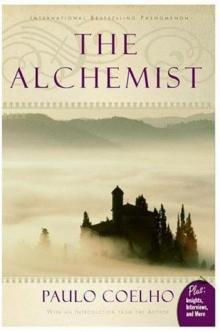 The Alchemist
The Alchemist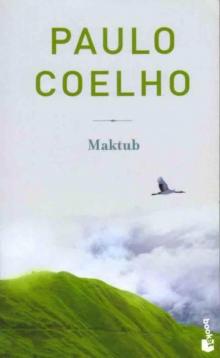 Maktub
Maktub Like the Flowing River
Like the Flowing River The Winner Stands Alone
The Winner Stands Alone The Spy
The Spy By the River Piedra I Sat Down and Wept: A Novel of Forgiveness
By the River Piedra I Sat Down and Wept: A Novel of Forgiveness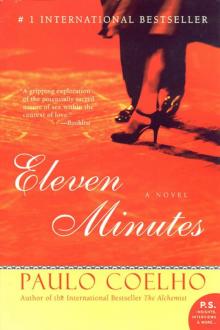 Eleven Minutes
Eleven Minutes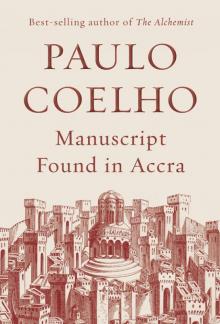 Manuscript Found in Accra
Manuscript Found in Accra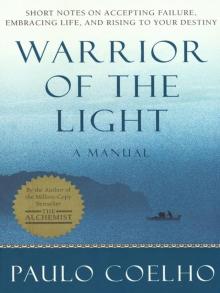 Warrior of the Light
Warrior of the Light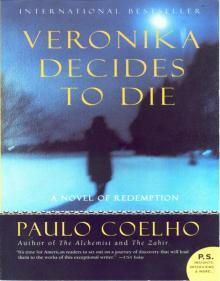 Veronika Decides to Die: A Novel of Redemption
Veronika Decides to Die: A Novel of Redemption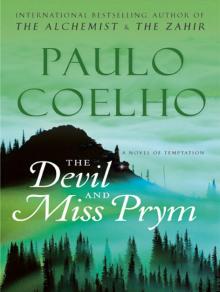 The Devil and Miss Prym: A Novel of Temptation
The Devil and Miss Prym: A Novel of Temptation The Valkyries: An Encounter With Angels
The Valkyries: An Encounter With Angels Brida: A Novel
Brida: A Novel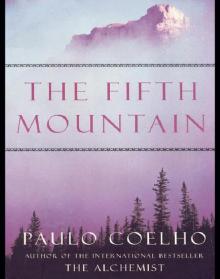 Fifth Mountain: A Novel
Fifth Mountain: A Novel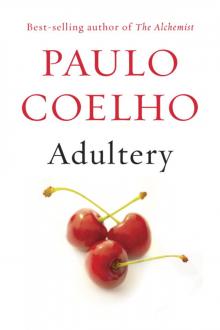 Adultery
Adultery Inspirations
Inspirations The Archer
The Archer The Witch of Portobello
The Witch of Portobello The Pilgrimage
The Pilgrimage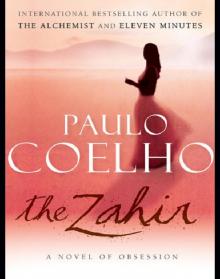 The Zahir
The Zahir Brida
Brida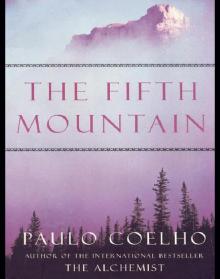 The Fifth Mountain
The Fifth Mountain Like the Flowing River: Thoughts and Reflections
Like the Flowing River: Thoughts and Reflections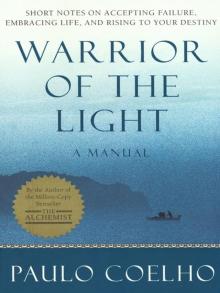 Manual of the Warrior of Light
Manual of the Warrior of Light By The River Piedra I Sat Down & Wept
By The River Piedra I Sat Down & Wept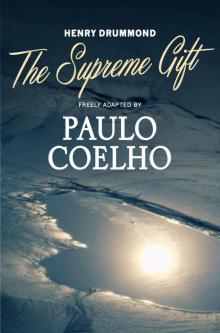 The Supreme Gift
The Supreme Gift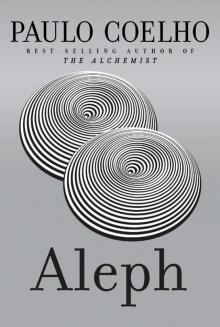 Aleph
Aleph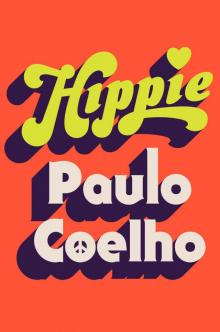 Hippie
Hippie Witch of Portobello
Witch of Portobello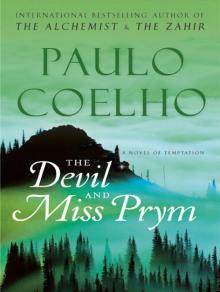 The Devil and Miss Prym
The Devil and Miss Prym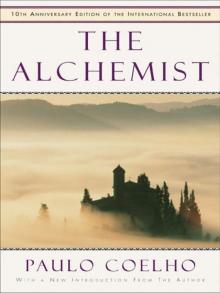 The Alchemist - 10th Anniversary Edition
The Alchemist - 10th Anniversary Edition The Valkyries
The Valkyries